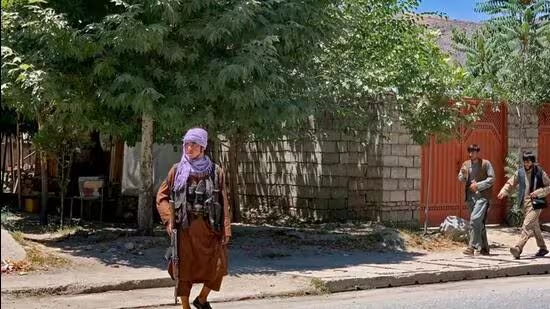Strong and symbiotic links between Taliban and al-Qaeda: UN report
The link between Afghanistan’s Taliban regime and al-Qaeda remains “strong and symbiotic” and the setup in Kabul has not delivered on counter-terrorism provisions under the Doha Agreement signed with the US, according to a new UN report.

The report by the Analytical Support and Sanctions Monitoring Team of the UN Security Council states that al-Qaeda is “rebuilding operational capability” and that “groups of foreign terrorist fighters are projecting threat across Afghanistan’s borders”.
The report also highlights reports of serious differences between the Taliban leadership based in Kandahar and ministers in Kabul.
In a statement issued on Sunday, Taliban spokesman Zabiullah Mujahid described the UN report issued on June 5 as “biased and far from reality”, and especially pushed back against the reported differences and disagreement between the Taliban leadership.
He also claimed the accusation that Afghanistan has become a “safe haven for terrorists” as baseless propaganda.
Also Read: Over 2.5 million girls deprived of education in Afghanistan: US special envoy
The reports of the UN sanctions monitoring team is based on inputs and reports from UN member states, including countries located in the neighbourhood.
The latest report repeats concerns that have been part of similar reports submitted by sanctions monitoring teams since the Taliban takeover of Afghanistan in 2021.
“The link between the Taliban and both Al-Qaida and Tehrik-e-Taliban Pakistan (TTP) remains strong and symbiotic. A range of terrorist groups have greater freedom of manoeuvre under the Taliban de facto authorities. They are making good use of this, and the threat of terrorism is rising in both Afghanistan and the region,” the new report stated.
While the Afghan Taliban have sought to reduce the profile of these terror groups and conducted operations against the Islamic State-Khorasan Province (ISIL-K or ISKP), the “Taliban have not delivered on the counter-terrorism provisions under the Agreement for Bringing Peace to Afghanistan between the United States of America and the Taliban”, the report said.
“There are indications that al-Qaeda is rebuilding operational capability, that TTP is launching attacks into Pakistan with support from the Taliban, that groups of foreign terrorist fighters are projecting threat across Afghanistan’s borders and that the operations of ISIL-K are becoming more sophisticated and lethal (if not more numerous),” it added.
The report was silent on the presence of fighters from Lashkar-e-Taiba (LeT) and Jaish-e-Mohammed (JeM) on Afghan soil – which has figured in other recent reports from UN sanctions monitoring teams – but said the presence of foreign terrorist fighters harboured by the Taliban “has become an increasing security threat to many neighbouring countries”.
People familiar with the matter said hundreds of LeT and JeM fighters are still in Afghanistan. They also described JeM as a more potent threat to Indian interests across the region.
The anxiety about foreign fighters “did not lessen” with the killing of al-Qaeda leader Aiman al-Zawahiri “in a Kabul guesthouse connected to Taliban acting Interior Minister, Sirajuddin Haqqani” in July 2022, according to the report. The report said, “that single event speaks volumes as to the credibility of Taliban commitments to break with terrorist groups as stated in the Doha Agreement”.
The report provides considerable details of reported differences between the Taliban’s supreme leader, Hibatullah Akhundzada, who is based in Kandahar, and leaders in Kabul such as acting interior minister and leader of the Haqqani Network, Sirajuddin Haqqani, and the acting first deputy prime minister, Mullah Baradar.
Leaders such as Baradar, who back efforts for the Taliban to gain international recognition and to expand foreign aid, are becoming increasingly frustrated with the “centralisation of power in Kandahar and over key policy decisions, such as the ban on girls’ education”, the report said.
These political differences surfaced on February 16 with a speech by Sirajuddin Haqqani criticising Hibatullah and similar comments were made by acting defence minister Mullah Mohammad Yaqub Omari.
“Since Sirajuddin’s speech, Hibatullah further heightened his own security in Kandahar [and already] limited access to Hibatullah has become even more tightly controlled,” the report said.
“Although the Taliban remain cohesive, the existence of divisions within the Taliban has created preconditions for the weakening of the de facto regime. At the same time, ongoing struggles for power among various factional leaders are further destabilising the situation, to the point where an outbreak of armed conflict between rival factions is a manifest risk,” according to the report.
“Member States judged that Taliban unity is likely to prevail, some predicting for at least 12–24 months. States in the region were concerned about the risk of a return to civil war should current Taliban policies continue,” it added.
Disclaimer: The copyright of this article belongs to the original author. Reposting this article is solely for the purpose of information dissemination and does not constitute any investment advice. If there is any infringement, please contact us immediately. We will make corrections or deletions as necessary. Thank you.
Title:Strong and symbiotic links between Taliban and al-Qaeda: UN report
Url:https://www.investsfocus.com









